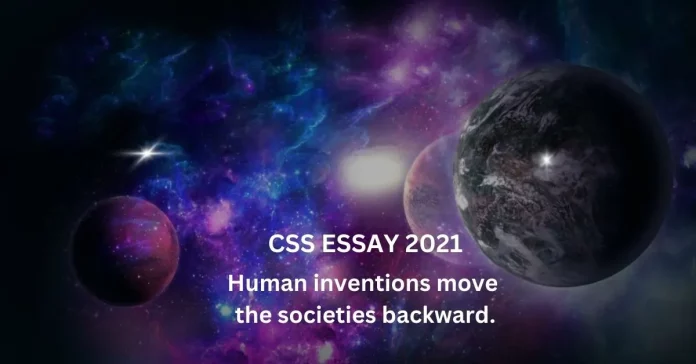Thesis statement
While human inventions have brought about significant advancements and progress in various fields, they have also inadvertently led to certain negative consequences that have moved societies backward.
Introduction
Throughout history, human inventions have been instrumental in driving progress and shaping societies. From the discovery of fire to the development of the internet, these inventions have revolutionized the way we live, work, and communicate. However, it is important to recognize that not all consequences of human inventions are positive. While inventions have propelled societies forward, they have also inadvertently caused certain negative outcomes, leading to a backward movement in certain aspects. In this essay we delve into the unintended consequences of human inventions, examining how they have moved societies backward in various ways.
Exposition: Understanding Human Inventions and Societal Progress
A. Defining Human Inventions and Their Impact
Human inventions encompass a wide range of discoveries and creations that have revolutionized different domains of human existence. They include technological advancements, scientific breakthroughs, and cultural innovations. These inventions have played a pivotal role in societal progress, driving economic growth, enhancing quality of life, and expanding knowledge and understanding.
B. The Notion of Societal Progress
Societal progress refers to the advancement and improvement of societies in various dimensions, such as economic development, scientific knowledge, social well-being, and cultural enrichment. Human inventions have historically been catalysts for societal progress, fueling innovation, increasing productivity, and improving living conditions.
Argumentation: Unintended Consequences of Human Inventions
A. Overreliance on Technology and Diminished Skills
One unintended consequence of human inventions is the overreliance on technology, which can lead to a diminishing of essential human skills. As technology advances, automation and artificial intelligence have replaced many manual and repetitive tasks previously performed by humans. While this has increased efficiency and productivity, it has also resulted in job displacement and a decrease in the demand for certain skills. This shift can have negative implications for individuals and societies, as it may lead to unemployment, a lack of job security, and a diminished sense of purpose and fulfillment.
B. Environmental Degradation and Resource Depletion
Another significant consequence of human inventions is the environmental degradation and depletion of natural resources caused by industrialization and technological advancements. The widespread use of fossil fuels, for example, has contributed to air and water pollution, climate change, and habitat destruction. Additionally, the extraction of natural resources to support technological development has led to resource depletion and ecological imbalances. These unintended consequences pose significant challenges for the sustainability and well-being of societies, jeopardizing the very progress that inventions aim to achieve.
C. Social Inequality and Technological Divide
The advent of new inventions has also contributed to social inequality and the deepening of the technological divide. While inventions have the potential to improve access to information, services, and opportunities, not all individuals and communities benefit equally. The digital divide, for instance, refers to the gap in access to technology and digital resources between different socioeconomic groups. This divide exacerbates existing social inequalities, limiting the opportunities available to marginalized communities and perpetuating disparities in education, employment, and socioeconomic status.
Description: Examples of Backward Movement Caused by Human Inventions
A. Case Study 1: Dependence on Fossil Fuels
The reliance on fossil fuels, such as coal, oil, and natural gas, has been a key driver of industrial development. However, the unintended consequences of this dependence have become evident. Fossil fuel consumption has contributed to greenhouse gas emissions, resulting in climate change and its associated impacts, including rising temperatures, extreme weather events, and sea-level rise. These environmental setbacks have the potential to disrupt ecosystems, compromise food security, and displace populations, thereby moving societies backward in terms of environmental sustainability and resilience.
B. Case Study 2: Impact of Social Media
The invention and widespread adoption of social media platforms have transformed the way we communicate, connect, and access information. However, the unintended consequences of social media have raised concerns about its impact on societies. One significant consequence is the negative influence on mental health and social relationships. Studies have shown a correlation between excessive social media use and increased rates of anxiety, depression, and feelings of loneliness and inadequacy. The constant exposure to curated and idealized versions of others’ lives can lead to social comparison and a sense of inadequacy, negatively impacting individuals’ well-being.
Furthermore, social media platforms have become breeding grounds for the spread of misinformation, fake news, and polarizing content. The rapid dissemination of unverified information can lead to societal division, erode trust in institutions and media, and hinder informed decision-making processes. The echo chambers created by algorithms that reinforce individuals’ existing beliefs can further contribute to polarization, hindering constructive dialogue and understanding among diverse groups. These consequences have the potential to undermine social cohesion and democratic processes, moving societies backward in terms of collective understanding and collaboration.
Narration: Lessons Learned and Moving Forward
A. Evaluating the Balance between Progress and Consequences
While the unintended consequences of human inventions are undeniable, it is crucial to evaluate the overall balance between progress and the negative outcomes. Human inventions have undeniably brought about remarkable advancements and improvements in various aspects of society. It is important to acknowledge and appreciate the positive impact they have had, while simultaneously critically examining the unintended consequences they may have caused.
B. Responsible Innovation for a Sustainable Future
Moving forward, responsible innovation becomes imperative to minimize the negative consequences of human inventions and ensure a sustainable future. Responsible innovation entails considering the long-term societal, environmental, and ethical implications of new inventions. This approach involves conducting thorough risk assessments, engaging in inclusive and participatory decision-making processes, and prioritizing sustainability and equity in technological advancements. By adopting responsible innovation practices, societies can navigate the complexities of progress while mitigating the backward movements caused by unintended consequences.
Conclusion
In conclusion, while human inventions have played a significant role in driving societal progress, it is important to acknowledge that they can also lead to unintended consequences that move societies backward. The overreliance on technology, environmental degradation, social inequality, and the negative impacts of social media are examples of such unintended consequences. Recognizing and understanding these consequences allows us to critically reflect on the balance between progress and the negative outcomes of inventions.
To move forward, it is essential to embrace responsible innovation, considering the long-term implications of inventions and prioritizing sustainability, inclusivity, and ethical considerations. By doing so, we can harness the transformative power of human inventions while mitigating their unintended consequences, ensuring that societies continue to progress in a sustainable and equitable manner. Through responsible innovation, we can shape a future where inventions not only drive progress but also contribute to the well-being and advancement of societies as a whole.











